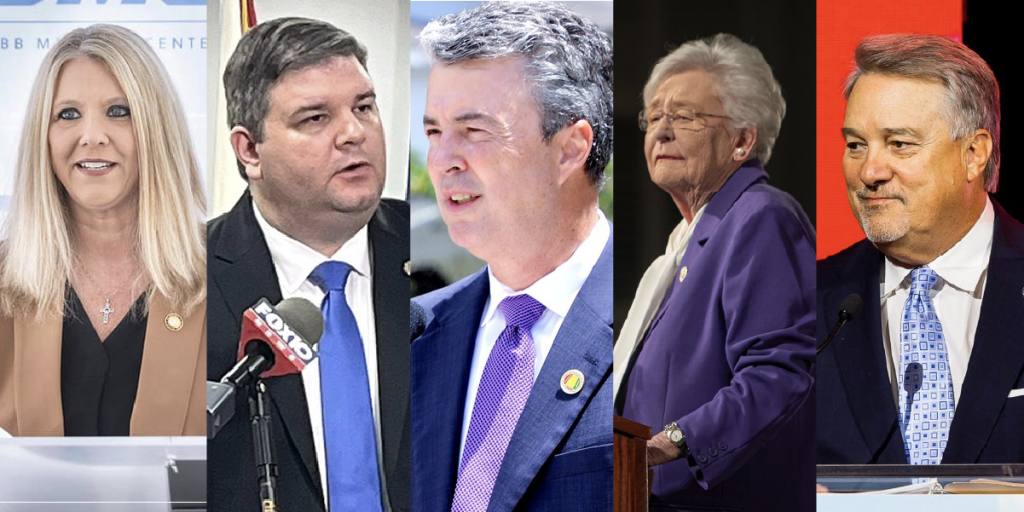MONTGOMERY — Now that Attorney General Steve Marshall has begun a full term of his own, his personal vision and policy priorities are more distinctly evident in driving the office’s work.
At the Montgomery Rotary Club’s weekly luncheon Monday, Marshall explained that since winning election in November, he finally had the chance to implement a long-term, big-picture plan for the attorney general’s office instead of being more “reactionary,” as he had to be after his 2017 appointment to serve the remainder of former Attorney General Luther Strange’s term. Just a few months into a four-year term now, Marshall and his team are already hard at work executing this plan and making his vision come to fruition.
“I’m a prosecutor — it’s how I’m wired,” Marshall explained. “And there really is no greater honor than to be the attorney general [given what I am passionate about].”
He summarized how he sees the role of attorney general into two relatively broad concepts: ensuring public safety and enforcing the constitutionally-enacted laws of the state.
“My job is to make sure we keep our people safe,” Marshall said, adding this was “one of the fundamental aspects of what we believe in this country.”
The second concept pertains to fulfilling his role in our democratic republic. Legislators enact laws, the executive branch (chiefly through the attorney general’s office) enforces these laws and the courts play their role by interpreting laws when settling challenges or disputes.
“My role is to defend the law of the state,” Marshall emphasized.
He then shared some of the ways his office has recently “embraced” these core duties.
‘I’m an unabashed fan of Jeff Sessions’
First, speaking on public safety, Marshall reflected on the state’s violent crime initiative that he announced last year, which led him to add, “I don’t mind telling you, I’m an unabashed fan of Jeff Sessions. To the extent I have a disagreement with the president, it’s probably chief among them.”
“One of the things Jeff Sessions did was to refocus this country on the issue of violent crime,” Marshall advised.
He reiterated a point that Sessions has also made in speeches over the last six months, including a few in Alabama — violent crime in the United States had dropped steadily starting with the Reagan Administration in the 1980’s, but sharply started to tick up again after President Barack Obama took office.
However, this trend was reversed under Session’s tenure as United States attorney general, with the violent crime rate in America dropping significantly.
“General Sessions really released our federal partners to be working with us,” Marshall outlined. “Particularly ATF, DEA and FBI. [He] told our U.S. attorney offices to start working gun cases again, because that had not been going on during periods of the Obama Administration. And for us to be able to bring people together at the state and local level to be able to work with [federal partners] collectively… Montgomery is one of those places in which we’ve seen successes from this initiative… violent crime was reduced by over 16 percent. And that matters.”
He continued, “Sometimes when we talk about those percentages, we get sort of locked into numbers. Well, y’all, that’s people. That’s lives. And that’s families that are safer today as a result of much of the work that we’re doing.”
Marshall explained that a large part of the recent violent crime focus in Alabama has been on areas in the Black Belt, especially Selma.
“People in this room who may say, ‘Why does this matter to us here?’ Well it matters because what we’re doing is tracing many of the guns that are showing up in Montgomery violent crime cases to Dallas County. We see people that are moving from Dallas County up this way to be able to commit many of their crimes. So, our efforts to be multi-jurisdictional, bringing people from throughout this region and area together, makes an impact throughout many, many communities,” Marshall said.
The attorney general said over 300 people have been incarcerated due to the state’s violent crime efforts in the last year.
Marshall, after more praise for Sessions, then transitioned into talking about digital forensics analysis. This is an area that he has emphasized as a critical focus moving forward, as there are not enough trained analysts in this field, which is one that continues to grow in importance and prevalence as technology advances. This is another field where federal, state and local collaboration is key when it comes to the sharing of resources.
Some priorities this legislative session
When it comes to the 2019 regular session of the Alabama legislature, which reconvenes Tuesday, Marshall mentioned the “right to life” as a matter of both faith and policy he was focused on and would be advocating for.
“[W]e saw our young ladies were showing up to abortion clinics, who were otherwise the victims of a crime that we know as rape second [statutory rape], but law enforcement never knew anything about it,” Marshall advised. “And I’m going to stop that.”
He said the attorney general’s office will be offering legislation to address this issue, which Marshall stressed is tied to human trafficking in many instances.
“It’s an issue of which I’m very passionate about,” he explained.
Marshall also circled overhauling the Board of Pardons and Paroles as a primary concern of his that he would be asking the legislature to address. This is something he has been working with Governor Kay Ivey on, after the board last year was discovered to have been letting violent offenders free too early and too often.
“We saw some things that were simply unacceptable,” Marshall said. “When somebody is doing a life sentence for murder, they’re not supposed to come up for parole after five years. Especially when people like me have sat down with victims’ families to say, ‘Nobody’s going to show up on offenses like that until the expiration of 15 years or 85 percent of their sentence.’ But, yet suddenly they’re getting a notice from the parole board – they’ve been convicted and sentenced for murder for life – and showing up after five years.”
“I don’t think you believe that’s acceptable,” he told the crowd. “I don’t think you see that as something that enhances public safety.”
“[O]ne of the things that you’ll see coming from us this legislative session would be ways to make sure that never happens again,” the attorney general said. “Because, although I believe there are appropriate paroles that take place, I believe there is a role for pardons in our system, it needs to be done responsibly.”
He added that if the members of the Board of Pardons and Paroles believe it is their responsibility to address prison overcrowding, “they are greatly misunderstanding their role on that body.”
“They are a public safety body,” Marshall advised. “They need to be making decisions that are appropriate for community safety, and then making those for valid reasons.”
Opioids, mental health
Answering questions from the crowd after his remarks, Marshall identified the opioid crisis and mental health care as two key areas that are not only intertwined with themselves and public safety, but with crime, too.
After touching on his personal experience with the issues, he explained that life expectancy in America has gone down the last three years largely due to the suicide and overdose rates.
“We’re the greatest country in the world, with the best access to healthcare, and yet our life expectancy has gone down,” Marshall lamented.
He said when he became attorney general, the state had no strategic plan on dealing with opioids. He made that a priority from the start, formed a task force with the blessing of Ivey, presented her a plan in December 2017 and is now executing that plan through his office and various partnerships.
The plan “has been recognized nationally as one of the most comprehensive” plans out there, Marshall said. And, most importantly, the plan does not just exist, but it is being diligently worked.
“We’re making progress… and I’m encouraged by where we are,” Marshall concluded.
Sean Ross is a staff writer for Yellowhammer News. You can follow him on Twitter @sean_yhn












